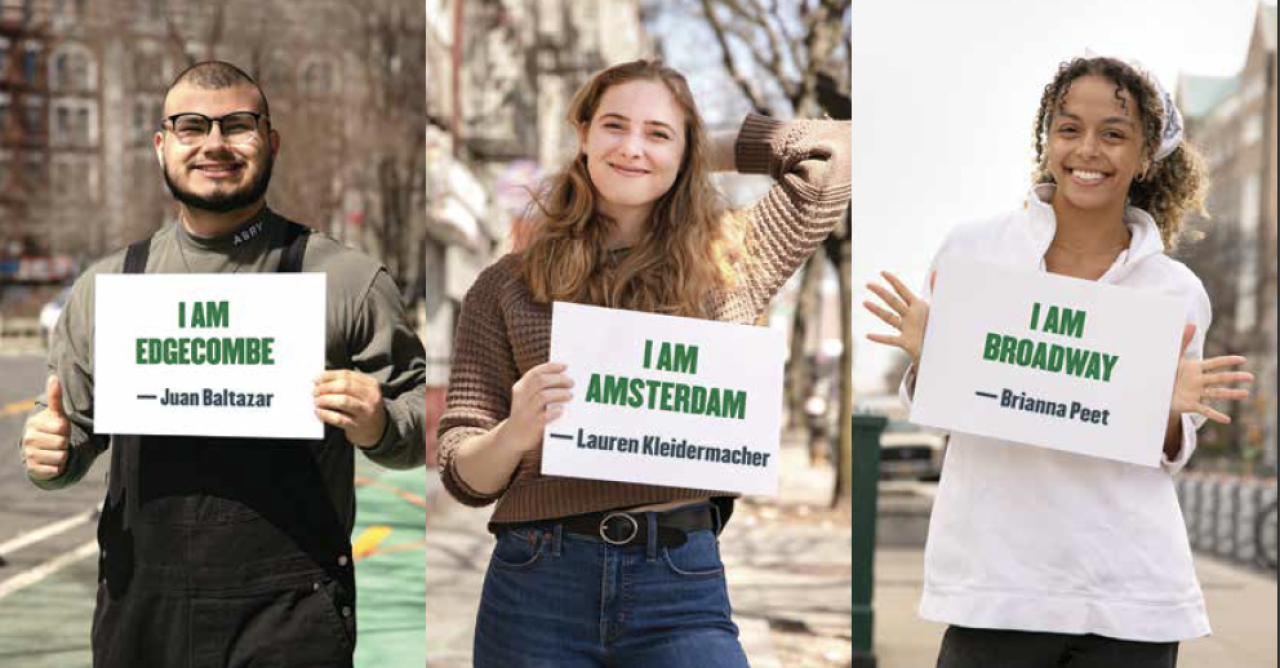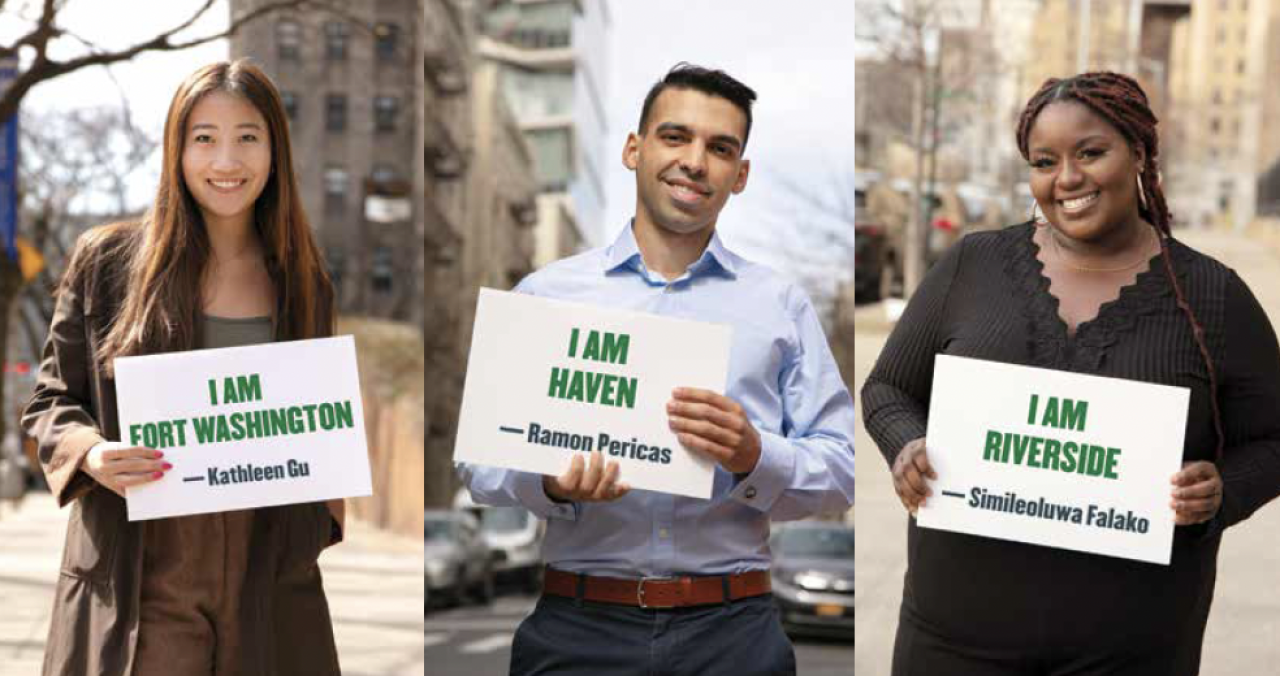
By Sharon Tregaskis | Illustration by John Roman | Portraits by Jorg Meyer
At the start of the 2022-23 academic year, Prashanth "PK" Kumar'25 and eight VP&S classmates attended a dinner with two dozen first-year students. The gathering, organized by the VP&S Office of Students Affairs, served as an icebreaker before the annual VP&S schoolwide boat cruise along the Hudson River. A few months later-before members of the Class of 2026 made their way to Broadway for showings of "Hadestown," "Lion King," "Phantom of the Opera," and "Wicked"-the same group gathered for dinner in Harlem. Throughout the semester, the first- and second-year students gathered to play chess and UNO, share lunch, and kick back.
This year, members of the first-year class-M1s-enjoyed several events with groups of second-year students known as M2 Peer Advisors, or M2PAs. "My role is to connect M1s with resources and opportunities, talk them through the transition to life as a medical student, help out however I can," says Mr. Kumar, who is one of 54 second-year students in the inaugural group of M2PAs who work with six groups of students-or "houses"-led by advisory deans.
The new M2PA initiative-and the associated "house" system, which also launched as part of orientation for new students in August 2022-cultivates "near-peer" advising relationships to augment the advisory dean system that has been administered by the Office of Student Affairs for the past 20 years. Felicia Goodman, senior director of student affairs at VP&S, proposed building a house program and led the design and implementation of the pilot in partnership with student leaders, faculty, and colleagues. Each incoming student is assigned to one of six "houses," each named after a Washington Heights thoroughfare-Amsterdam, Broadway, Edgecombe, Fort Washington, Haven, and Riverside-and each led by an advisory dean with support from the assigned M2PAs. Each house is formed from two Foundations of Clinical Medicine small groups, and the faculty preceptors for the course also play an important role in the house.

The new house system establishes a web of relationships among first- and second-year students as part of the orientation process-before M1s even know what they need to know. Monthly hangouts and informal gatherings provide opportunities for first- and second-year students to exchange information during the school year. "I'm just there, answering questions, hanging out, checking in while playing board games," says Mr. Kumar, who has fielded queries from M1s seeking tips for exam prep or just venting about feeling overwhelmed by their coursework.
"The vision is to cultivate a community where students really feel a sense of inclusion and belonging," says Lisa Mellman, MD, senior associate dean for student affairs. "Our goal is for each student to have an experience in medical school in which they thrive academically, professionally, and interpersonally." Ms. Goodman credits seven leaders of the Class of 2025-Gabrielle Wimer, Konje Machini, Joshua Dawson, Charu Vyas, Prateek Sahni, Apoorva Mehta, and Kenny Egbuonu-with contributing to the launch of the pilot house program.
House functions augment other events and outings organized by the Office of Student Affairs, including a field day competition that was held last fall in Riverside Park.
Over time, the network of each house will span all four classes enrolled at VP&S, plus recent graduates, as successive incoming students are assigned to houses. The resulting vertical communities will comprise networks of social ties that connect M1s to doctors at every level of training and practice.
Before the advisory dean program launched in 2003, a first-year medical student had to rely on old-fashioned pluck, approaching whatever faculty member or upper-level student seemed likely to offer help. Peter Puchner'62, professor emeritus of clinical urology, and Linda Lewis, MD, former dean of students, envisioned a formal structure for mentoring every student. The resulting advisory dean program launched with five specially trained faculty members as advisors, including Dr. Mellman, then a faculty member in psychiatry, and Donald O. Quest'70, the J. Lawrence Pool Professor of Neurological Surgery.
For two decades, Dr. Puchner chaired the program, overseeing the competitive process for selection of new advisory deans and a formal training program that features presentations on student services, including academic support, financial aid, housing, and student health. The newest advisory dean, Gina Badalato'07, associate professor of urology, has been serving alongside Dr. Quest, an outgoing advisory dean, this spring to learn her new role.

Every two weeks, advisory deans host a lunch focused on navigating current or upcoming transitions and on particular specialties or types of career: how to prepare for exams, what to expect during the major clinical year, the risks and rewards of dual-degree programs. "We also deal with themes we find important," says Dr. Quest, who has covered such topics as epidemics and gun violence.
Often, the role of an advisory dean toggles between career advising and more personal conversation, says advisory dean Salila Kurra'03, associate professor of medicine, who leads Haven House. Consider, for example, the rankings each student must provide for the residency matching process. "People are deciding what's important to them-being close to family, training at a particular institution. We're guiding students through that process with a sharp focus on what they're prioritizing."
Working with students as an advisory dean since 2016 has helped invigorate her own career, says Dr. Kurra, who previously directed the endocrinology fellowship. "Students have infectious enthusiasm for medicine. Being involved in their journeys from the beginning and helping them think through the choices that will lead to happy careers is a unique privilege."
Early in her own first year at VP&S, a combination of imposter syndrome and the sheer volume of information she was consuming made for a tough transition, says Dr. Kurra. To make sure students have the support they need, advisory deans schedule one-on-one meetings with each of their M1s. "Even if you're not inclined to seek help, it's an opportunity to connect." Almost all students uses the full 30 minutes she schedules for each check-in. "Students really want to talk about their experiences."
"Students have infectious enthusiasm for medicine. Being involved in their journeys from the beginning and helping them think through the choices that will lead to happy careers is a unique privilege."
The house system being piloted for the advisory dean program increases formal and informal opportunities for peer advising. When Nadine Khoury'25 entered VP&S, she jumped into extracurriculars with both feet, an approach that brought her into contact with a wide swath of upper-level students. In addition to serving as an M2PA with Haven House, she serves as co-president of Systems Leadership Integration Management; director of finance and a member of the quality improvement committee for CoSMO, the student-run clinic; co-president of the Musicians' Guild and a performer in Musical Mondays; and anatomy course coordinator for the Student Success Network.
As an extrovert, Ms. Khoury had a relatively easy time connecting with peer mentors. "A lot of experiences at Columbia hinge on what you choose to do in the first few months," says Ms. Khoury. "If you don't have a network of people available, it can be hard to find the information you need."
Having the sympathetic ear of a peer who already knows the VP&S culture can make a world of difference, says Ms. Khoury. "There's a certain frame of reference you have on the community, a vibe that helps you know what's appropriate in a given time or place, what's the norm, even little things-the formats of our lectures, knowing the internal flashcard decks we have and how to use them. Now we have older students taking it upon themselves to disseminate videos and information sheets on how to use those resources."
Peer mentors also ease the transition to big city living for students from out of town. Mr. Kumar has helped Broadway House M1s find renters insurance, navigate the housing market, and zero in on good restaurants. "I see people interview and apply and I want to make sure they're happy and thriving here," says Mr. Kumar, who is the admissions representative for his class. "I feel like I've been part of their journey. I've promised them that it's a wonderful environment, and I want to see them succeed."






